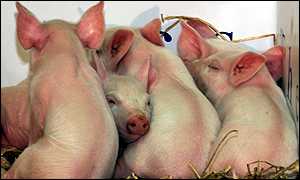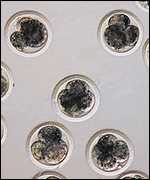
URL: http://news.bbc.co.uk/hi/english/health/newsid_1180000/1180270.stm
Date accessed: 25 February 2001
BBC News
Tuesday, 20 February, 2001, 11:55 GMT

Xenotransplantation, and in particular, the use of organs from animals to replace those failing in humans - is seen by many as a part solution to the chronic shortage of available donor organs.
However, the latest report from the government watchdog - the UK Xenotransplantation Interim Regulatory Authority, suggests that at the moment, it is too risky to contemplate.
Scientists fear that even tissues from specially bred and quarantined pigs may harbour unidentified viruses which could spread and cause disease in humans.

Pig embryo clones could help remove viruses
|
The watchdog says that stem cell research may ultimately yield greater benefits.
However, scientists in the field refuse to be downbeat about the prospects of xenotransplantation.
They believe that it may yet be possible to reduce the risks to humans to acceptable levels.
Professor Robin Weiss, of University College London, was one of the first to sound the alarm about the unknown risks of pig viruses.
Now he says the pendulum of scientific opinion has swung too far against xenotransplantation.
'No zero risk'
He told BBC News Online: "There can never be a zero risk. But we are making progress.
"At the moment, I would have said that research is going along at quite a fast rate.
"There is a quite a lot of danger of infection even in human to human transplants - who knows whether members of the British population are incubating vCJD?"
Xenotransplantation is certainly not finished
|
|
Dr Andrew George, Imperial College, London
|
He said: "It's possible we may even have a drug here to treat people if viruses are passed into them."
Another leading xenotransplantation researcher, Dr Andrew George, from Imperial College in London, was equally upbeat.
He told BBC News Online: "Clearly this is a problem, and more research is needed.
"But over the last year or so we have had both good news and bad news.
"But simply by doing this sort of research we learn an awful lot that can be used in other areas of medicine, so it should continue.
"Xenotransplantation is certainly not finished."
Another breakthrough made last year was the successful cloning of a pig.
This lays open the possibility that pig retroviruses - which are carried in the genetic makeup of the animal rather than being foreign "invaders" - could be modified out of the cloned pig.
Animal rights
However, it is still likely to be some time before the idea of whole-organ xenotransplantation can be contemplated.
There are also significant objections by animal rights campaigners, who condemn as unnatural the sterile living conditions which would have to enclose the pig providing the organ throughout its life.
Two major players in UK xenotransplantation research, Imutran and PPL Therapeutics, are both ending their work in the UK.
Category: 30. Xenotransplantation